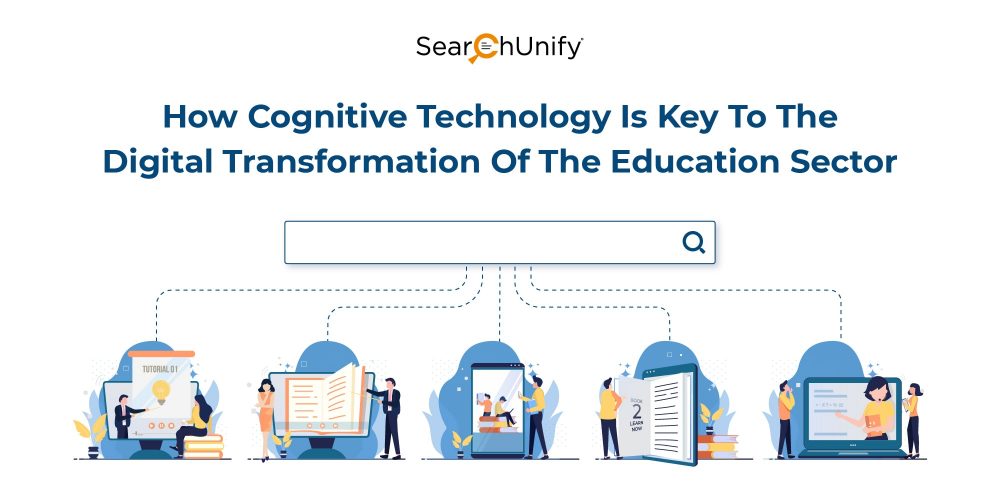
What a difference a few weeks make. We fell asleep and woke up, literally, in a different world.
A few weeks ago, about 120 countries closed schools as a measure to contain the effects of Covid-19, a snowball rolling down the hill and ravaging everything in its track. As of now, nationwide closures are impacting over 91% of the world’s student population. Hence, most of the learning has moved off-campus and students, teachers, and the management are bracing themselves for this new mode of education i.e, online learning.
There’s no dearth of means for the digital transformation of education – cloud based applications, software, and tools to support teaching, learning and assessment. Despite all the help, and your IT pros setting up a virtual environment, this sudden disruption brings with itself a fair share of challenges.
This blog post will discuss how cognitive search can help:
Challenges Faced By Students
Colleges and universities are scrambling to adapt different technologies such as Slack and Zoom to quickly turn their academic programs internet-ready. But even then one of the major problems confronting students is easily finding relevant information across different databases & websites.
What a student wants could be residing anywhere ranging from online library catalogs, theses, working papers, research guides, journals, to simply under one of the options on your website’s navigation (or menu) bar. And with the addition of all the new platforms, students have a hard time finding the knowledge they need, which in turn impedes learning.
Here’s another challenge that institutions providing a wide range of courses—Engineering, Arts, Law, Medicine, etc.—will face, that is if they haven’t already. Let’s say a student searches for “IPL”. Now, this term means entirely different things in Law (Intellectual Property Law) and computer science (initial program load). How do you ensure that your students don’t end up with a result that has nothing to do with their field of study?
How Cognitive Search Can Help
All these challenges can be taken care of with just one addition to your online environment: Cognitive Search Engine. It is an AI-powered solution with the ability to index disparate content repositories and provide relevant results in the same window where search is performed. This helps students to find what they need without any tab-hopping.
Additionally, machine learning ensures that the search engine leverages student profile and behavioral data of similar users (same class or subjects) to self-learn and provide personalized and contextual results. This makes your online classrooms twice as efficient with half the effort.
Challenges Faced By Faculty
Tools like Moodle and Google Classroom are enabling educators to create an online space laden with e-learning projects & modules. But one thing worth pointing out is that some professors will be venturing into the distance learning space for the very first time. The overnight transition will be hard for them.
Another struggle is going to be streamlining the exchange of assignments between teachers and students. While learners have to focus on multiple subjects, the faculty has to juggle through a bucketload of assignments from students across classes. On top of that, they also need to log into different cloud-based apps for marking attendance and organizing their work.
All this can feel like drowning in a sea of processes. There needs to be a system in place which can help them by simplifying access across channels. On top of that, it should be simple enough that it doesn’t demand extra time for training.
How Cognitive Search Can Help
Cognitive search streamlines information discovery and hence improves the process. And here’s the best part: hardly any training is required. It consists of inbuilt connectors that aid users with cross-domain searches to make relevant content easily discoverable.
Once you integrate a cognitive engine with different content sources—video library, G Suite, Slack, etc—all your staff needs to do is just type what they want in the search bar and the engine will take care of everything else.
It also offers dynamic facets that are customizable & easy to configure. These help professionals to narrow down search results and categorize content by file type, date, program, etc. Users can even bookmark searches & access them whenever they want. This way they can pick up where they left off, hence making the experience seamless.
Challenges Faced By Management
In addition to taking care of all the challenges mentioned above, gauging students’ learning and ensuring engagement on various course pages also falls on the management’s shoulders. How do you check everything is working?
As uncertainty rises with each passing day, parents, as well as students, are flooding the administrative staff with questions for courses, fees, examinations, e-learning systems, etc. The list is endless. As management, how do you calm worried parents and answer endless, anxious queries? The answer lies in online student communities or discussion forums. And even there, cognitive search can help.
How Cognitive Search Can Help
First, let me tell you that a cognitive engine is also called an insights engine. The reason being—It provides advanced insights into user behavior, content usability, and content gaps from your online properties. It generates user-friendly reports that detail metrics such as Searches With No Results, Unclicked Searches, Successful Searches to drive engagement as well as improve the student experience.
At SearchUnify, we have developed another cool feature called Community Helper. It comes in real handy to enhance user experience on student online communities which are bombarded with queries. Built on powerful AI-based algorithms, it recognizes the questions asked and scans the entire database to auto-respond with helpful articles, taking self-service to a whole new level.
The Silver Lining
While we all battle to stay relevant in this new normal, some optimists are of the opinion that this is an opportunity to adjust to the future of education, at least, the near future. Maybe if done in the right way with the right tools, this crisis could prepare diverse, future-ready learners to lead.
SearchUnify is a cognitive search platform and fuels seamless information discovery for next-gen students. It takes just a few minutes to be deployed. Its 40+ connectors integrate multiple content sources of different formats with ease. It’s a highly versatile product that will not only help you to ride out the storm but also lead the revolution of the education industry. If you think, we could be a good match click here for a demo.
And while you’re at it, don’t forget to wash your hands.











